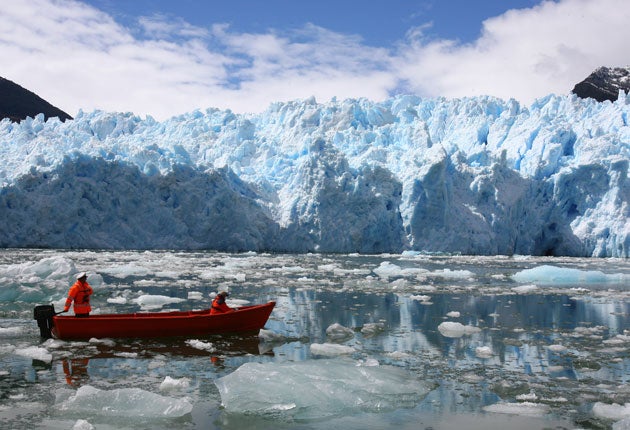Glaciers melting at fastest rate in 350 years, study finds

Your support helps us to tell the story
From reproductive rights to climate change to Big Tech, The Independent is on the ground when the story is developing. Whether it's investigating the financials of Elon Musk's pro-Trump PAC or producing our latest documentary, 'The A Word', which shines a light on the American women fighting for reproductive rights, we know how important it is to parse out the facts from the messaging.
At such a critical moment in US history, we need reporters on the ground. Your donation allows us to keep sending journalists to speak to both sides of the story.
The Independent is trusted by Americans across the entire political spectrum. And unlike many other quality news outlets, we choose not to lock Americans out of our reporting and analysis with paywalls. We believe quality journalism should be available to everyone, paid for by those who can afford it.
Your support makes all the difference.Some mountain glaciers are melting up to 100 times faster than at any time in the past 350 years.
The findings, based on a new ice loss calculation technique developed by studying the glaciers of Patagonia in South America, have worrying implications for crop irrigation and water supplies around the world. The quantity of ice lost from Patagonia is equivalent to a fifth more than the contents of Lake Erie, one of the Great Lakes of North America.
Scientists behind the discovery claim their findings show that the rate of melting at the start of the 20th century was much slower than previously calculated, but that over the past 30 years it has been significantly faster than suspected.
Using the spread of moraines – the debris left by glaciers and the trimlines on mountainsides where the vegetation starts (effectively the high-tide mark of glaciers), a team led by Professor Neil Glasser of Aberystwyth University was able to compile a complicated series of calculations to work out the volume of ice that has disappeared. Since the Little Ice Age ended in Patagonia 350 years ago – they concluded – the 270 glaciers that now cover an area of at least one square kilometre have lost 606 cubic kilometres of ice and perhaps another 123 cubic kilometres. It is the first time the historic volume of water lost from melting glaciers has been calculated accurately so far back in time. It relies on three-dimensional calculations of each glacier at its peak. The figures show the contribution to sea level rise is increasing, though still at a low level, but what alarmed the team most was that the rate of loss has sped up rapidly since 1980.
"The glaciers have lost a lot less ice up until 30 years ago than had been thought. The real killer is that the rate of loss has gone up 100 times above the long-term average. It's scary," said Professor Glasser, who carried out the study with the University of Exeter and Stockholm University. He pointed out the glaciers are at the same latitude in the southern hemisphere as the Alps are in the northern hemisphere. These are also known to be retreating and he suggested it is quite likely they are losing ice more rapidly than was thought: "If we looked at them, I'm pretty sure we would find they are also speeding up their loss rate."
Mountain glaciers are relied on around the world, but research suggests that, globally, they are losing mass and speeding up. In a few places some are increasing in mass due to higher precipitation. The calculations in Patagonia allowed the team to estimate sea level rises over more than three centuries. Professor Glasser said: "Previous estimates of sea-level contribution from mountain glaciers are based on very short timescales. We used a new method that allows us to look at longer timescales."
Join our commenting forum
Join thought-provoking conversations, follow other Independent readers and see their replies
Comments